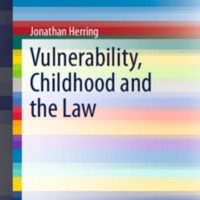Vulnerability, Childhood and the Law / Jonathan Herring.
Title
Vulnerability, Childhood and the Law / Jonathan Herring.
Description
Title from PDF of title page (viewed, May 7, 2019)
This book will challenge the orthodox view that children cannot have the same rights as adults because they are particularly vulnerable. It will argue that we should treat adults and children in the same way as the child liberationists claim. However, the basis of that claim is not that children are more competent than we traditionally given them credit for, but rather that adults are far less competent than we give them credit for. It is commonly assumed that children are more vulnerable. That is why we need to have a special legal regime for children. Children cannot have all the same rights as adults and need especial protect from harms. While in the 1970s child liberationists
mounted a sustained challenge to this image, arguing that childhood was a form of slavery and that the assumption that children lacked capacity was unsustainable. This movement has significantly fallen out of favour, particularly given increasing awareness of child abuse and the multiple ways that children can be harmed at the hands of adults. This book will explore the concept of vulnerability, the way it used to undermine the interests of children and our assumptions that adults are not vulnerable in the same way that children are. It will argue that a law based around mutual vulnerability can provide an approach which avoids the need to distinguish adults and children.
Creator
Publisher
Springer,
Date
Contributor
SpringerLink (Online service)
Format
1 online resource (vi, 70 p. )
Language
eng
Type
a
Access Rights
Publisher's Web site. Access restricted to the University of Catania community.
DOI
10.1007/978-3-319-78686-5 doi
ISBN
9783319786865 (electronic book)
Series
SpringerBriefs in Law
SpringerBriefs in Law.
Collection
Citation
Herring, Jonathan., “Vulnerability, Childhood and the Law / Jonathan Herring.,” Lex e-books - Collana, accessed December 27, 2025, http://ebooks.unict.it/omeka/items/show/135.

